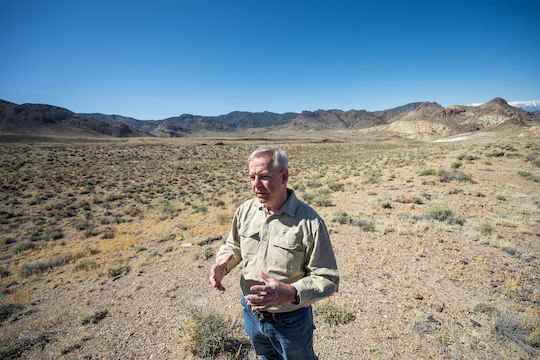The Biden administration has approved the Rhyolite Ridge Lithium-Boron Project in southern Nevada, a significant step toward expanding domestic production of lithium, a mineral crucial for electric vehicle batteries and other green technologies, the Washington Post reports.
While the Interior Department’s Bureau of Land Management (BLM) issued the final permit on Thursday, some environmental groups remain concerned about the impact on local ecosystems, particularly on a rare wildflower, Tiehm’s buckwheat, which grows exclusively in the lithium-rich soil of Esmeralda County, Nevada.
In its approval, the BLM determined that the project, spearheaded by Australian mining company Ioneer, would not jeopardize the wildflower’s survival. The company plans to safeguard around 719 acres designated as critical habitat for Tiehm’s buckwheat, with measures intended to mitigate ecological harm. Laura Daniel-Davis, the acting deputy interior secretary, emphasized that the mine aligns with the administration’s goals for “responsible critical mineral development” to support the transition to clean energy while preserving public land.
The Rhyolite Ridge mine is expected to produce enough lithium annually to power approximately 370,000 electric vehicles for over two decades, significantly boosting US lithium output, which currently constitutes only 2% of the global supply. However, environmental advocates, such as Patrick Donnelly from the Center for Biological Diversity, argue that this development may risk the endangered buckwheat’s survival. Donnelly has announced plans to challenge the decision in court, stating that the permit potentially violates the Endangered Species Act, which safeguards at-risk species without exceptions based on mineral demand.
Alongside concerns over local biodiversity, environmentalists have raised questions about water usage at the mine, a key issue given the prolonged drought affecting much of the western United States. Bernard Rowe, Ioneer’s managing director, addressed these concerns, noting that the mine would recycle about 50% of its water to conserve resources and has been designed to minimize environmental disruption.
The Rhyolite Ridge project has garnered significant economic and political support, including conditional federal loans of $700 million and backing from Nevada Senator Jacky Rosen, who cited its potential to create hundreds of well-paying jobs in Nevada. The project is expected to create around 500 construction jobs and 350 operational roles when fully operational in 2028, enhancing Nevada’s role in domestic lithium and boron production.
This approval aligns with broader federal efforts to bolster US mining for critical minerals. On the same day, the Treasury Department confirmed that mines for minerals like lithium will qualify for federal tax credits, further incentivizing domestic production.








